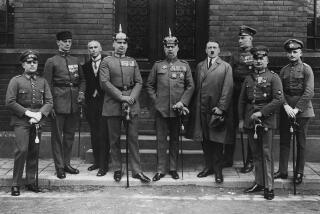Joy, Tempered With a Bit of Hypocrisy
Like those thousands of Chileans roaring their joy in the streets of Santiago, I cheered at the astonishing news Wednesday that the law lords in Britain had denied immunity to Augusto Pinochet, thus opening the road to his extradition to Spain. From his hospital bed, the 82-year former dictator of Chile watched, live on television, the announcement of the judges’ decision. He now faces an uncertain twilight, quite possibly having to answer in a Spanish courtroom for his role in the deaths of Spanish nationals in the coup that brought him to power in 1973.
For millions of leftists across the world, Pinochet’s bloody overthrow of the democratically elected socialist government of Salvador Allende was one of the cruelest blows of the postwar years. The coup against Allende affirmed with absolute finality a judgment passed by the United States almost 20 years earlier, with the coups against two other elected social democrats, Iran’s Mohammed Mossadegh and Guatemala’s Jacobo Arbenz.
The judgment was simple: No matter how lawful the election or how large the popular mandate, no party or politician espousing a program that included land reform and kindred populist programs would ever be permitted to survive.
So of course we exult today that Pinochet cannot look forward with utter confidence to equable senility, that there is some justice in the world.
But here precisely is where we should pause and ask ourselves some simple questions. If there is truly justice in the world then, the next time Henry Kissinger steps onto foreign soil, there will be a warrant seeking his arrest and his extradition. It was, after all, Kissinger, as secretary of state, who stated that the Chilean people should not be permitted the irresponsibility of electing Allende. It was Kissinger who oversaw the whole covert U.S. program designed to destabilize Allende’s government and to furnish every covert form of assistance to Pinochet and his co-conspirators.
And if not extradition to Chile, then why not kindred extradition orders for Kissinger from Cambodia or Laos or Vietnam or any of the other nations where torturers, death squads and military goons were pressed into action by this man, when he was the prime executive of U.S. foreign policy?
Suppose the government of Vietnam now began to press for extradition for William Calley or senior officers in the chain of command that organized the massacre at My Lai? And then we have every appalling massacre in Central America in the 1980s to consider. There are plenty of retired generals, hands red with well-attested butchery, from Guatemala and El Salvador, now living comfortably in the United States.
In other words, if we look at this issue in terms of the 14th Amendment, there is no equality before the law when it comes to these quests for extraditions or to international tribunals considering crimes against humanity in all their infamous abundance. Here we find soon enough that there is one law for the powerful, such as the United States, Britain, France and other such nations, and another for the rest.
Would U.S. courts have extradited Pinochet? The answer is as certain as the refusal of the U.S. government to honor the request made by the government of Cuba to extradite Orlando Bosch, convicted of complicity in the blowing up of a Cuban civilian airliner in 1976, killing 76 people. Also enjoying safe port in the United States is Emmanuel Constant, former head of the Haitian paramilitary organization, Front for the Advancement and Progress of Haiti, which killed hundreds in the wake of the 1991 coup in Haiti. Then-Secretary of State Warren Christopher said Constant was “instrumental in sustaining the repression that prevailed in Haiti under the illegal military-led regime.” Yet the U.S. State Department has refused Haiti’s extradition request for Constant and stopped his deportation.
Under rapid evolution these last few years have been a kind of transnational kangaroo court system to which the United States and its allies can hale their enemies for retribution. For such enemies--Serbs or whomever--there is no real prospect of due process, no trial by jury and, without a jury, such courts considering criminal conduct have no true standing.
I could imagine an international tribunal convened by weak nations, preferably ones without a standing army or navy, and with a multinational panel of jurors. In the unlikely event of any powerful nation honoring its warrants and subpoenas, that tribunal’s decisions could be awaited with some reasonable expectation of justice. But for now, amid Pinochet’s pleasing discomfiture, we should avoid any larger sense of jubilation. The hypocrisies are too blatant.
More to Read
Sign up for Essential California
The most important California stories and recommendations in your inbox every morning.
You may occasionally receive promotional content from the Los Angeles Times.










